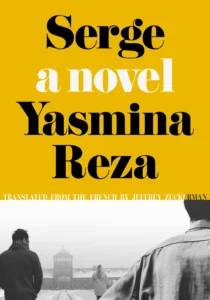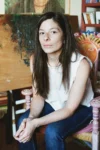
[Restless Books; 2025]
Tr. from the French by Jeffrey Zuckerman
My introduction into the work of Yasmina Reza was nothing if not serendipitous: A few years ago, during a graduate seminar on visual culture I teach at the University of Łódź in Poland, the respected theater company Teatr Jaracza staged a Polish-language production of her play Art (Sztuka in Polish). Given that the subject of her play—the personal, cultural, and economic value of visual and conceptual art—was central to the ideas my seminar was exploring and discussing, I organized a class trip to see the play. Like me, the students were delighted by it, with one student declaring afterwards, “That was amazing! I usually hate everything, but that was great!” The collective enthusiasm for the play that we felt in Łódź was, of course, mirrored in many other cities, countries, and languages, which only partially explains why Art was the first translated play to win a Tony Award for Best Play in 1998. The basic conceit of Art is that one friend buys a very expensive painting by a conceptual artist, and this decision recalibrates the dynamics within the trio of friends in ways that are, at turns, hilarious and heart wrenching, revealing the tenuousness of even the deepest friendships. Of course, who doesn’t question the decisions their friends make? Do we appease, confront, or ignore choices we might profoundly disagree with? And then what?
Considering my previous experience of her writing, I jumped at the chance to read Reza in English translation by the renowned French-to-English translator Jeffrey Zuckerman, whose work I’ve enjoyed and admired for many years. Add to that the fact the book is called Serge, a name shared by one of the characters of Art, and my enthusiasm was amplified, thinking this novel might be a kind of offshoot from the play (while plenty of writers have revisited characters from previous works, this was not the case in Serge.) While Art is limited to a trio of characters, Serge—despite its single name—is more of an anthology of characters and narratives. Indeed, there is the eponymous Serge, the chain-smoking misanthropic obsessive-compulsive eldest sibling of the Popper family. As a character and in terms of behavior, Serge wouldn’t be out of place in any number of Michel Houellebecq novels—he’s the sort of person who attends his daughter’s dance recital but can’t find a single nice thing to say to her or insists on changing hotel rooms because the room number has bad vibes. His other talents include relentlessly badmouthing his sister, his Spanish brother-in-law, his nephew, and almost anybody else in his path while doubling down on hubris. For example, Serge sees his brother-in-law Ramon as an unemployed schemer living on the government dole (he’s not), while Serge himself drifts from one scheme to another hoping for a major windfall.
However, Serge is contrasted with two other siblings: Jean, the middle child, narrator, and “blank slate,” who is fascinated by his emotionally and professionally stunted older brother, perpetually seeking his favor; and Nana, the youngest sister and frequent butt of the two brothers’ in-jokes. Added to the mix are various partners, children, and some extended family attached to the siblings. The portrait of the Popper family starts with the siblings’ parents, a pair of strong personalities themselves and a study in contrast. For the father, “Anyone who didn’t revere Israel—the only, only democracy in the region!—was anti-Semitic. Full stop. He would add, ‘Don’t listen to your mother, she’s anti-Semitic.’” Meanwhile, their mother has a hypochondriacal streak, sending Serge and Jean to summer camp as children with a 110-kilo bag, “a complete pharmacy.” She also “had a weakness for [Vladimir] Putin, she thought he had sad eyes” and proudly displayed a “calendar with Putin petting a cheetah.” Although the Popper children don’t absorb their parents’ political affinities, Serge certainly inherits their penchant for fomenting discord.
So, while the novel is entitled Serge, the book is more of a portrait of a middle-class blended French family—an unsurprising toggle between friction and comfort, some desire for emotional human connections and the deep-seeded resentments that can undo those bonds. If the scale of Art spans the trio of friends prompted to acerbically accuse and defend their life choices because of an artwork, the narrative in Serge is a kaleidoscopic form of intimacy, panning in and out to create new perspectives on the expanding (or sometimes contracting) cast of characters. The term kaleidoscopic is particularly apt here, because while reading I was regularly reminded of a different celebrated novelist and playwright: American writer Don DeLillo. Serge would not feel unfamiliar to DeLillo enthusiasts, particularly novels from the early part of his career—think The Names or White Noise. Jean and Serge are characters often at a remove, allergic to emotional vulnerability and instead offering irony-tinged remarks or judging others in the shared currency of sarcasm. For instance, as Jean notes, “It’s hard to tell apart a relevant emotion and a brain malfunction.”
After Serge’s partner Valentina throws him out and he crashes at his brother’s place temporarily, Jean similarly looks at his older sibling with a mix of curiosity, apprehension, and bittersweet recognition of a marginal life:
There’s something touching about the posture of a man sitting at the end of a bed. Shoulders slumped, chest sagging. Beds aren’t made for such situations. A Hopper painting shows an almost fully dressed man in this indecisive moment. His hands dangle between his legs; he stares at the floor. Behind him, although it’s not immediately noticeable, is a half-naked woman asleep and facing the wall. When I think of that image I don’t remember her: the man is on his own, a loneliness that’s just as visible by day as by night, that’s nothing like other presences, the light, the décor. The loneliness is the bed and the weary pose. It’s the wait for nothing. Nobody sees the man. The unobserved body accedes to despondency. This oddity of being unseen by anyone is reminiscent of childhood, of the possibility that the future might be empty. My brother, who had always been such a big presence, was suddenly smaller now.
When Jean remarks that “the unobserved body accedes to despondency,” in effect he’s admitting that he’s worried about his brother being lonely, unseen. Catching a glimpse of Serge in a moment of unvarnished vulnerability, however, doesn’t bring the brothers closer; rather, Serge “was suddenly smaller,” less a figure to admire and more somebody to quietly pity. The very practice of seeing others so critically, which was a shared bond for the brothers, instead is turned against Serge. For his part, Serge needing his younger brother’s help is a form of defeat and demystification. Just as DeLillo can create sentences and paragraphs that can simultaneously propel the narrative forward while also offering prose poem-like mediations that prompt the reader to reflect outside of the novel, Reza’s descriptions share similar parallels. The above scene nudged me to reflect on moments of vulnerability within my own familial dynamics. Jean concludes “that I had some vague responsibility to [Serge]. I’m stronger than him now; I should watch over him.”
The narrative glue of the novel is the shared family trip to Auschwitz, less an “unexpected roadtrip” (as the jacket copy suggests), and more a kind of begrudging pilgrimage for the Popper siblings along with Joséphine. It’s a perfunctory attempt to connect to their Jewish roots and the relatives they lost in the Holocaust. Serge, ever the critic, chides his daughter for not pronouncing the name of the infamous camp correctly: “AOSHWITZ!” Serge shrieked. “‘Osvitz’!! Like the goys! Learn how to say it right! Auschwitz! Auschhhhhwitz! Shhhh!” Maurice’s view of the trip is cynicism tinged with bigotry from the outset: “‘So, you’re forking over money to those Polacks. What else are you doing at Auschwitz?’ . . . If I got my legs back, that’s the last place I’d go.” When the trip actually occurs, it offers little in the way of epiphanies, however. Jean muses, “Remember. But why? So as not to do it again? But it will be done again. Knowledge that isn’t closely connected to oneself is useless. One can’t expect anything of memory. This fixation on memory is a sham.” For the Poppers, Auschwitz is “a museum. A stretch of limbo revamped for modern-day visitors.” The Auschwitz pilgrimage, however, doesn’t offer catharsis or produce some deeper sense of belonging, and no stronger family bonds are cemented. Serge, for his part, spends the bulk of his time outside of the various sites at the camp, a figure on the periphery more interested in smoking, nursing a craving for rice pudding, trying various Polish beers, and making wise cracks. Reza accurately depicts details in Poland with great care, including the names of well-known Polish beers, Żywiec, Lech, Tatra, or Okocim, as well as noting that the town of Oświęcim has “the most flowers I’ve ever seen in my life, ever. The lampposts are wreathed in a crinoline of flowers, every fifteen meters multihued corollas are spilling out of trays, Eskimo-shaped floral statues are strutting about on the plazas, not to mention the countless shrubs and pots.”
When at Auschwitz, Jean sees “[s]tenciled on a façade . . . Jean-Paul II alongside the words Antysemityzm jest grzechem przeciwko Bogu i ludzkości. Serge translates: ‘Jews make for good fertilizer.’” Obviously, that’s not how the Polish inscription reads, but rather “Antisemitism is a sin against God and humanity.” This scene was also the only time in the novel that I suddenly became aware I was reading a translation, all because of seeing the name “Jean-Paul II” (I’ve only really seen the former pope’s name in English as John Paul II or in Polish as Jan Paweł II.) That it took such a minute detail for me to pause my reading experience for a split second is a testament to Zuckerman’s talent as a translator. His sentences simply hum.
After their visit to the infamous concentration camp, the Poppers spend some time back in Kraków, which Reza describes as tinted in a consumerist haze reminiscent of DeLillo’s White Noise:
Intermarket, Auto Komis, Brico. It doesn’t feel like a different country. On both sides of the highway, day lingers on a few valleys. I suddenly feel overcome by nostalgia for Miami (where I’ve never been). A balcony, let’s say the fourteenth floor, in the fifties. Night. Warm weather, the smell of gas and marsh plants. The skyscrapers’ light visible through the railing. Me sitting in a plastic chair, life going by, the ocean, the sounds of traffic. Me as an old man, with all the melancholy of a plastic armchair, of a banana tree in its tiny pot.
Jean’s post-Auschwitz reflections serve to further flatten the impact of the trip. Instead, the narrator’s mind moves to finding analogies between France and Poland, the comfort of familiar retail auto repair and hardware stores, or clinging to a nostalgia for what never was with an imagined Miami, with the attendant emotions reduced to “all the melancholy of a plastic armchair.” In the concluding scene in Birkenau, Jean sees the camp as: “No pretenses. The train tracks go straight toward death. All paths, sooner or later, lead there. At Birkenau, the industrial project of annihilation is evident.” Jean’s observation is consonant with DeLillo when he writes in White Noise that “All plots tend to move deathward,” and in both books, trains are, in fact, transporting death.
At times I couldn’t help but wonder how this novel was written by the same person who wrote Art. But when I came across this passage—a meta-moment, an interpolation addressed to the complicit reader—it lingered long in my mind and had me rethinking various episodes in the book and how I initially experienced them:
What about you? I wonder as we look, among the dozens of souvenir shops on a crowded pedestrian street, for a local restaurant. What kind of stuff do you think you’re made of? You go to and fro across this earth on budget flights just as unthinkingly. You tread the same path: horror at dawn, medieval fair at dusk. You’re no different. You don’t want to be mistaken for them, but even that unwillingness—a last bit of pride—goes to show what you really are. You know there’s no other world anymore and your complaint is just as unthinking.
Indeed, what does it say about us as people that we can be so easily inured to voyeuristically watching people, fictional or real, inflict so much harm—emotionally, physically, and technologically—on themselves and each other? Or that we can reflexively criticize as if we somehow always have the moral high ground, take some sliver of satisfaction in somebody else’s failure or setback? I’ll admit that much of Serge’s behavior, as well as that of other characters in the novel, repulsed me, even as they felt exceedingly familiar. It’s probably not any great shock that Serge’s chain-smoking is the culprit for some cancerous growths in his throat, and the medical tests and procedures Serge has to undergo were some of the very same my deceased father had—and for exactly the same reason. Serge, Jean, Maman Popper, and others—they may be bigoted, cringey, maddeningly self-interested or self-destructive, and frustratingly childish, but they are all too real.
There were moments while reading Serge that I thought of Jesse Eisenberg’s film A Real Pain, for the obvious parallels of two relatively recent narratives focused on a tenuously connected family making a trip to Auschwitz in search of some deeper meaning, and how the mercurial behavior of one character can override everybody else’s emotional weather system. However, where Serge’s misanthropy and sourness are almost metronomically consistent, Kieran Culkin’s Oscar-winning performance as Benji effectively demonstrates the Whitmanian emotional multitudes that humans contain. At stake in such multitudes, of which Reza’s novel surely is another substantial contribution, seems to be a fundamental rejection of the premise of Adorno’s dictum “To write poetry after Auschwitz is barbaric.” With Serge, Yasmina Reza offers us a cast of characters who have so fully internalized the fact that barbarism existed before Auschwitz and continues into the present day that such horrors register as little more than a shrug, a discomfiting reminder of the myriad ways that humans are shrewdly particular, resilient, and, yes, deeply flawed. A visit to Auschwitz does not mandate epiphanies for all, and the Poppers, whose relationship to their Jewish heritage and history is cobweb-like at most, are not fundamentally changed. As the great Polish writer Witold Gombrowicz argued in his genre-bending Diary, “no history will replace your own personal consciousness, maturity, depth. Nothing will absolve you of yourself.” The Poppers seem to understand this, and Jean could be speaking for most of his family when he admits, “I didn’t know how I should steer myself emotionally through these realms of cosmic names, Auschwitz and Birkenau. I waver between coldness and a quest for emotion that amounts to a certificate of good behavior.”
Mark Tardi is a writer and translator whose awards include a 2023 PEN/Heim Translation Grant and a 2022 National Endowment for the Arts Translation fellowship. He is the the author of four books, most recently, Recapitulation in the Wrong Key (BlazeVOX, 2025), and The Circus of Trust (Dalkey Archive, 2017), and his translations include Viscera: Eight Voices from Poland (Litmus, 2024), Unsovereign by Kacper Bartczak (above/ground, 2024), The Squatters’ Gift by Robert Rybicki (Dalkey Archive, 2021) and Faith in Strangers by Katarzyna Szaulińska (Toad Press, 2021). Recent writing and translations have appeared in Bombay Gin, Poetry, Conjunctions, MAYDAY, Interim, Guernica, Cagibi, Tupelo Quarterly, Denver Quarterly, and Full Stop. He is on faculty at the University of Łódź.
This post may contain affiliate links.






